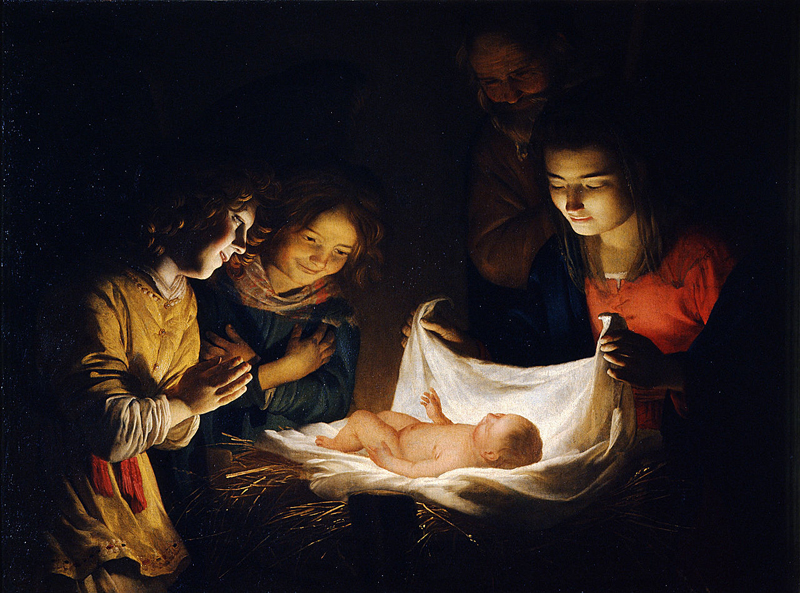 |
| "The Adoration of the Child" by Gerrit van Honthorst, 1590-1656 |
The time has come to celebrate the birth of a child born in a nondescript village on the margins of a great and powerful empire. Many children probably were born that very night. The Monty Python movie Life of Brian even tells the story of another child born that very night in the same town as Jesus. The question that tonight holds, is what makes this child so special? If, as any parent will tell you, their child is the most important or special child ever born, why should we pay attention this child among all the children born that night?
The reading from the Gospel of Luke, which takes us to a child lying in a manger in Bethlehem, pictures angels appearing in the sky to shepherds in their fields, singing “Glory to God in the highest heaven, and on earth peace among those he favors.” With this song in their hearts, the shepherds pay a visit to the Holy Family, sharing the news with the happy parents that their child is truly blessed.
The reading from the Book of Hebrews provides a more theological take on this story. The four verses that open the book offer a summary of the gospel message, beginning with the revelation that while God had spoken over time through the prophets, now God had chosen to speak through the Son, who is the heir of all things and through whom God created all things. This Son, whom we know as Jesus, “is the reflection of God’s glory and the exact imprint of God’s very being.”
It’s this reference to Jesus being the “reflection of God’s glory” that caught my eye. It’s a reminder that the gospel message has always been that Jesus is the embodiment of God’s true nature. This message is also found in the opening verses of the Gospel of John, which starts with the declaration: “In the beginning was the Word, and the Word was with God, and the Word was God.” Much like Hebrews, John tells us that it was through this Word, that God created all things, and in this Word all things hold together. Finally, in verse 14, we read: “The Word became flesh and lived among us, and we have seen his glory, the glory as of a father’s only son, full of grace and truth.”
This child, whose birth we’ve come to celebrate this evening, is the true reflection of God’s glory. While attempts were made to extinguish this reflection of God’s glory, in the end this child will sit “down at the right hand of the Majesty on high, having become as much superior to angels as the name he has inherited is more excellent than theirs.”
I began this meditation by asking the question: what makes this child special? Why do we come this evening to celebrate his birth? It’s a good question. Maybe it’s the decorations or the music? I’ve always loved Christmas Eve, going back to my childhood, when I was often an acolyte serving at the altar, or later when I sang in the choir. For the past twenty-one Christmas Eves, I’ve been tasked with sharing a meditation on Christmas Eve that brings out the message of the season. I’ve often turned to a favorite Christmas movie or TV show to illustrate this message. This year I couldn’t come up with a direct link, unless you consider Life of Brian to be a Christmas movie. But, maybe the word that speaks to us tonight is an invitation to let the glory of God, which Jesus embodies, shine forth in our own lives. Yes, may we embody the spirit of the child born in Bethlehem though our lives. By letting that light shine, God will speak again the message proclaimed by the angels: “Glory to God in the highest heaven, and on earth peace among those he favors.”
Picture attribution: Honthorst, Gerrit van, 1590-1656. Adoration of the Child, from Art in the Christian Tradition, a project of the Vanderbilt Divinity Library, Nashville, TN. http://diglib.library.vanderbilt.edu/act-imagelink.pl?RC=56753 [retrieved December 24, 2018]. Original source: https://commons.wikimedia.org/wiki/File:Gherardo_delle_Notti_o_Gheritt_van_Hontorst_-_Adorazione_del_Bambino_-_Google_Art_Project.jpg.
Preached by:
Dr. Robert D. Cornwall, Pastor
Central Woodward Christian Church (Disciples of Christ)
Troy, Michigan
Christmas Eve
December 24, 2018
Comments